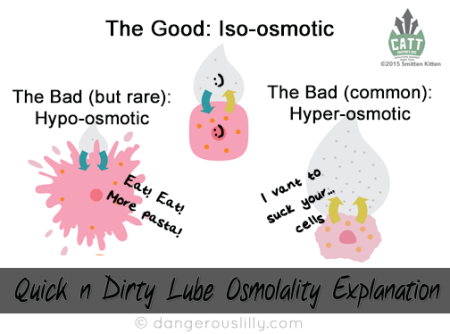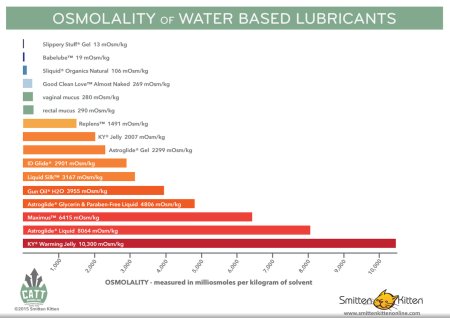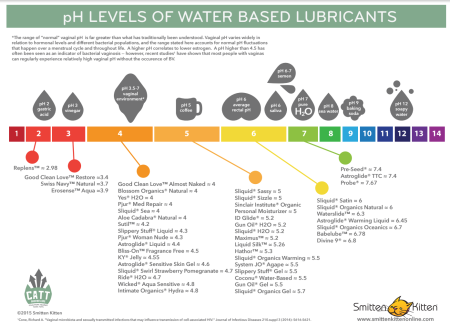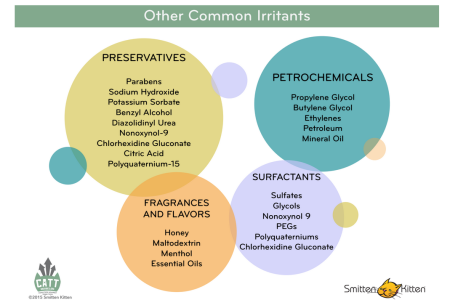This page is all about something you don’t see me talking about much here – Lube. Just because I don’t review it and don’t use it much, doesn’t mean it’s not super important for most people. I happen to (usually) produce enough natural lubricant on my own and so it’s not something I use very often. I also don’t use sex toys anally, so there’s that. Anal activities **require** lube, and lots of it. For many people with a vagina, irregardless of arousal, they need lube – whether it’s just how their body is, or it’s a side effect of a medication they’re on, or it’s part of their health issues OR the sex toy they’re using is particularly textured. It’s normal to use lube! But not all lube is created equal. In fact, I’m sorry to tell you that most readily-available commercial lubes SUCK. Plus, the best lube for sex (vaginal) may not be the best lube for anal sex and may not be the best lube for masturbation. Chances are pretty good that if you’re using a quality sex toy made from body-safe materials and you are experiencing irritation and burning anyways, the irritation and burning is coming from your lube. Whether it’s bad for you, bad all around, or it went bad. Yes, lube does expire! And most of us aren’t about to make yam lube, either, so I’ve gotta help you find the best commercial lubes out there that won’t poison your genitals.
Explain it Like I’m 5 – What’s Osmolality?
We’ve got three situations – the best is if the lube is iso-osmotic – meaning your cells and the lube sit there next to each other, happy, making each other better. They’re content. If the osmolality is low, i.e. hypo-osmotic, then the lube is like my Italian best friend’s mom – eat, eat! It’s feeding the cells too much water, and at some point they will burst. When does this matter the most? If you’re trying to conceive. Hypo-osmotic lubes would kill the lil swimmers. The most common situation is when the osmolality is high, i.e. hyper-osmotic. It’s the vampire situation – the lube comes in all charming at first and things seem okay. The lube feels really slippery, which is great! But it’s slippery because it’s drinking the moisture from your cells. When they have no more to give, they are dead and dry. The outer layer of cells will slough off and leave your mucus lining very vulnerable, like standing in a snowstorm without winter gear. STI transmission can increase and at-risk people are at greater risk for infections – this is the same group of people who need to use more lube than the average person. Diabetics, those with a compromised immune system, those undergoing treatment for cancer, etc. If your partner has Herpes, you’re doing everything you can to avoid transmission – consider the lube, as well. Stick to iso-osmotic lubes.
Molality is defined as the amount of substance (measured in mol) of solute, divided by the mass (in kg) of solvent, (not the mass of the solution). In other words, it’s the measurement of the mass of the stuff that’s dissolved in a liquid.
Osmolality is a variation of molality that only takes into account solutes that contribute to a solution’s osmotic pressure, and Osmotic Pressure in this instance is the measure of the tendency of a solution to take in water by osmosis.
Unfortunately we’re largely left to guess when it comes to osmolality because only a small handful of lubes have been tested. In addition to those listed in this chart I found a few extra listed here (including Probe brand which seems to be pretty close to iso-osmotic) and I also contacted the makers of System Jo lube who say that the Agape version is at 350 and the new version of H2O (which will be released in October) will have an osmolality of 200 (current is 800). We can make educated guesses on the osmolality by knowing a few things: that certain ingredients cause the osmolality to increase. So by avoiding those ingredients we can have a better shot at a lube that plays nice with our body. Of course, you can also avoid this by using coconut oil or silicone-based lubes. We don’t know how osmolality affects hybrid lubes (which are water-based with a little silicone added) because no one has ever tested them. Do they suddenly get to skip the rulebook because of the small amount of silicone? Maybe? But to stay safe, pick hybrids with very few ingredients.
Second you need to consider pH.
pH results are easy to come by – you can buy pH test strips yourself and test out your lube (or your mucus) at home if it’s not on this list below. The pH of the vagina can range from 3.5 – 7 depending on where you are in your cycle, if you have an infection, if you’re pre/post menopausal, etc. Post-menopausal women tend to have a higher pH. Higher pH is also associated with bacterial vaginosis but it can also be the normal course of cycle for you. Anal lubes need a higher pH so a lube that is good for your lower-pH vagina could really sting when used for buttsex.
Let’s go back to the vagina though for a minute. If you’re trying to conceive, you need a slightly higher pH as well to be friendly to sperm. Lubes with a low pH can sting and burn. Lubes with a higher pH than the vagina can bring on yeast infections and bacterial vaginosis OR just feel itchy (butt or vag) without the infection. Notice how Replens, once again, seems to be unfriendly to the very group it is targeted at? That’s considerably lower than it should be. The pH numbers below are less disconcerting, overall, versus the osmolality ratings but you should still refer to this chart. In addition to the glory of Sliquid there are other stand-out brands, but we have lubes that ranked super high in osmolality ranking right on target in pH. But that doesn’t make them okay because the next factor is….
INGREDIENTS! READ YOUR LABELS!
Sometimes there are so many scientific words in the ingredients list that we don’t even know what they are. Are they safe? Will they burn, are they a known irritant?
There are a lot of problematic ingredients and this goes way beyond parabens. In fact, it’s been suggested that parabens might not be the Big Bad Monster – studies about the effects of parabens have been done by feeding mass doses of it to mice…naturally, they’re going to experience bad side effects! You may never use enough lube to rack up enough parabens to cause cancer but some people are allergic to parabens. Of course, paraben is also a xenoestrogen, but a weak one. Xenoestrogens can have a feminizing effect on masculine bodies and masculinizing effects on feminine bodies. The other top two ingredients to avoid are glycerin(e) and propylene glycol. Both of these greatly increase the osmolality of the lube (making it a lube to avoid) and both can cause sensitivities (and for some, yeast infections). Other lube ingredients are listed below and any of them can cause irritation in addition to: increased STI transmission; killing off of the good bacteria; increase of bad bacteria; allergic reactions.
AVOID: Glycerin(e), Propylene Glycol, Nonoxynol 9, Chlorhexedine Gluconate, Petroleum Oils, Polyquaternium-15, Benzocaine, Sugars & Sugar Alcohols, Ureas
Why you should avoid Benzocaine. It numbs you, which is not really a good thing. I am unsure if the numbing creams for premature ejaculation will transfer the numbing agent to the vagina, but benzocaine is an irritant. Benzocaine used for those experiencing painful sex or those wanting to make anal play less scary is just a bad idea because pain is your body’s way of saying HEY STOP. You can end up with injuries, microtears to the delicate tissue, and major problems.
A note for Celiacs or those with extreme gluten-sensitivity: Avoid “Oat Beta Glucan” which is found in Sutil. I contacted the company about that ingredient (because not all oat is contaminated with gluten, but some super sensitive people react to oats no matter what) and they have confirmed that there is gluten present in that lube. When I was trying it out I also licked it and it made me ill for a day, so it’s enough gluten that if gluten makes you sick even in tiny quantities, avoid this lube. Avoid Vitamin E (tocopherals) unless the company can assure you they are not derived from a gluten-containing grain. These can also be derived from soy, for those with soy allergies. Sliquid’s Organics line uses Vitamin E and this is what they have to say about it:
Our Natural Tocopherols are extracted from wheat germ, sunflower, and safflower oils. One thing to keep in mind (and you can find this info on http://glutenfreedietitian.
com and other sites) is that refined oils are exempt from allergen labeling by the Food Allergen Labeling and Consumer Protection Act, and the European Food Safety Authority, because the refining process renders them virtually free (undetectable) of allergenic proteins. Consuming refined wheat germ oil is still not recommended for anyone with a gluten allergy, however, there is still another refining step where the Vitamin E (tocopherol) is extracted from the refined oil.Add to that, the amount of Natural Tocopherols in any one bottle of Sliquid Organics is less than 5%. For a highly sensitive person, or someone who just wants to be extra careful, we would suggest the Naturals line from Sliquid. In fact, for anyone with any food allergy, we recommend Sliquid Naturals, just to be safe.
Note: if your lube is paraben-free it can go bad much more quickly. There are preservatives that are natural but they don’t seem to do quite as good a job as paraben preservatives. Keep an eye on the color of your lube and the odor. If it’s off, toss it. Try to avoid pump bottles (air = bacteria) or sticking your finger in the lube bottle.
RESEARCH YOUR INGREDIENTS: Lately I’ve been looking into various lubes when someone has mentioned that they caused burning/irritation, and I’m finding even more weird and suspect ingredients. I usually just Google the individual ingredients and read over the first few results. Some sites will make something sound worse than it is, some will whitewash it. Some will confuse you. I mean why would you put an abrasive agent that’s normally found in toothpaste, in a lube? But there it was, in a System Jo arousal gel (and shamefully, System Jo doesn’t publish ingredients so thank goodness for reviews).
UNDERSTAND SENSITIZERS: If in your research you find that an ingredient is referred to as a “sensitizer” it means that the likelihood a person will react to these ingredients depends on how much they’ve used them – sensitivity it cumulative and increases with use. This means you can find yourself not reacting at first, but reacting after your 2nd or 3rd bottle or even 4th or 5th use of the first bottle. UREAS are one example of sensitizers, and you’ll find these in a lot of cosmetic ingredients (so they’re a common irritant to sensitive-skinned people).
What about the FDA? What about lubes that make medical claims?
A bunch of experts were polled on their thoughts about the FDA and lube. Most said “oh, absolutely, we welcome the FDA, the FDA knows best!”. But as Sarah Mueller pointed out – the FDA doesn’t always know best. They approved Nonoxynol 9, after all, and it’s been shown to INCREASE STI transmission! The FDA testing process doesn’t actually test how a lube will affect human genitals! They test it on rabbits – their eyeballs and vaginas. In fact it really does seem like the FDA cares about two things: that you pay your fee (which can range from $20,000 to $300,000) and that you either do animal testing or go to much length to prove you do NOT need animal testing. So what if you wanted only lubes that are FDA-approved? Well let’s consider that the awful KY Yours-And-Mine duo (hideous ingredients) is FDA approved. Surgilube is FDA-approved.
Another troubling fact: If your lube is FDA-approved then you DO NOT have to list your ingredients. Anywhere. This spells trouble for those that are high risk or have allergies. Just consider Surgilube – they say it’s proprietary so they won’t tell you even if you ask because of allergies. Just because it’s FDA-approved doesn’t mean it’ll be iso-osmotic, a good pH or free from common irritants. The FDA-approval process for lubes needs a major overhaul before I think it’s something Good For The Public.
STI Prevention Claims
Something I’m seeing a sharp increase in is lubes containing carrageenan, and the lube companies making claims about STI prevention. There have been some studies on this and they’ve had positive results, but a lot more research needs to be done. I would, for now, be wary of these claims. Just because a lube with this ingredient, for this claim, is FDA-approved does not mean it can prevent the spread of an STI. They’re not stamping a seal of approval or efficacy. One such FDA-approved lube is called Divine 9 / Carraguard, from Carrashield Laboratories. They make some grand, yet vague, claims on their website that might lead you to believe that they’ve proven that their lube can prevent the spread of certain STIs but you have to really hunt and read for the truth:
The excellent results in the NCI laboratory studies have led to the launch of three large scale human clinical trials using Divine 9. These are the only three human clinical trials in the world on HPV prevention using a topical gel and Divine 9 is featured in all three. While no conclusive evidence exists yet that Divine 9 with CarraShield will block HPV in humans, the results of the NCI tests were compelling enough to justify multi-million dollar investments in these three Phase 2 human trials. CarraShield Labs will provide updates as the data collection continues. At this time CarraShield Labs makes no medical claims about Divine 9 and provides this information strictly for educational purposes.
So they’ve gotten it classified as a medical device and gone for FDA-approval to give the idea of something grand and medicinal, but the tests aren’t conclusive and there haven’t been enough tests, or tests on humans. The human tests aren’t concluded, I believe.
Basically, anytime you see a lube making any claim that it can help prevent the spread of any STI, don’t believe them. The large-scale clinical trials and conclusive results are not here yet. When they happen it will be major news.
LUBE RECOMMENDATIONS:
First I want to say that osmolality and pH and ingredients don’t play a role in pure plant oils like coconut oil, or silicone lubes. We don’t know what role they play in hybrid lubes (which can be really awesome – there’s not really enough silicone in a hybrid lube to fuck up most silicone sex toys, but it’s enough to give that slippery, long-lasting appeal). Check the ingredients on the hybrids and avoid the bad stuff if you’re sensitive. Unfortunately, even some of these good lubes can irritate very sensitive people sometimes. While the amount of citric acid in lubes like Sliquid is small, sometimes it’s enough to irritate someone.
I understand that most people don’t want to buy their lubes online but unless your local drugstore carries Good Clean Love (some do) or Sliquid (rare) the brands I’d recommend are going to be found online. This isn’t the most accessible, I know, but for many people it’s necessary. If you care about what’s going in your body and strive for non-porous body-safe sex toys, consider overhauling your lube kit, too. I would recommend the following lubes based on ingredients, pH and known/assumed osmolality:
Water-based Lubes:
All Sliquid brand (and their Organics line) are good on the osmolality, pH and ingredients lines. Organics line can have aloe which can present issues for some and all Sliquid has a small amount of citric acid as a preservative. Only the most sensitive would be bothered by it. Try:
- • Sassy for a thicker anal lube and H20 for a thinner lube – Both of these are free of aloe
- • Sea also has aloe; it contains carrageenan which MAY help prevent the spread of HPV, plus other oceanics-ingredients to help with inflammation and dryness
- • Sliquid Pack to try out various types
- • While I prefer that you shop for lube at sex toy stores, Amazon does carry Sliquid if you just need to purchase lube and not sex toys.
- • Lovehoney US and Lovehoney UK carry some Sliquid lubes, but not all.
- • Smitten Kitten carries a few of the Sliquid Organics lubes
- • The Organics Line1 has some organic ingredients and all of them contain Vitamin E and Aloe, amongst other natural stuffs.
Good Clean Love 2 is a good brand, also, for pH and ingredients. Definitely check out the Almost Naked variety. I’ve got a review here! Love the stuff!
- • SheVibe seems to carry the whole line
- • Smitten Kitten carries two GCL products
- • Amazon also carries Good Clean Love
Smitten Kitten, a progressive queer-and-female-friendly shop based in Minnesota, carries brands that many other sex toy stores don’t.
- • Hathor Aphrodesia – they have Sutil which sells like hotcakes; it is much longer-lasting than most water-based lubes on the market3. The regular H.A. has some interesting ingredients like Horny Goat Weed which can contribute to bad taste. Note: Sutil contains Oat Beta Glucan, which is a gluten ingredient. Company has confirmed there is gluten in the lube.
- • WaterSlide which could be really great for those sensitive to most ingredients – it’s a thin, slippery lube with nearly no taste.
- • Aloe Cadabra which rates well on taste, too.
- • Southern Butter’s Bliss On is rated well by SK. There is some alcohol in it, but so far no one has reported irritation.
- • Smitten Kitten’s curated sample packs. Each pack contains 5-6 lube samples from different brands, all of them true, body-safe lubes. They’ll also send you their Lube Info pamphlet.
SheVibe carries:
- • Probe is good on both osmolality and pH and is formulated to feel more like natural vaginal lubrication
- • Coconu has a water-based lube that looks good
- • Blossom Organics looks decent, but contains Vitamin E and I can’t get an answer on the source so those with soy allergies and gluten limitations should steer clear
Goodvibes has their own Please brand. The Liquid and Gel are the water-based.
I found another option through Amazon. Astroglide makes a Naturals lube that is shockingly free of any crap ingredients. I don’t know where it falls on the osmolality scale; sensitive folks should pay attention to the ingredients4 for anything they might find irritating.
YES brand is under FDA scrutiny and a sort of “lockdown” for import into the US while they wait on becoming FDA-certified. But I’d heard so much good stuff about this brand that I had to locate it. You can find it on Amazon and according to YES, it should be genuine YES brand lube. How they’re doing it, I don’t know; the seller must be partnered with a European seller. You can find YES brand at Lovehoney US and Lovehoney UK, because all Lovehoney US orders come from the UK.
Hybrid Lubes
These are awesome because they combine the toy-safety of water-based with just a littttttle silicone (how much varies between brands). Now since silicone doesn’t affect osmolality or pH, and there haven’t been studies on hybrids, we don’t know how hybrids fare on osmolality or pH. So for that reason I still say to avoid osmolality-raising ingredients and irritants. I used to enjoy Wet’s Syngery lube but it has ingredients I can’t recommend. Spunk lube seems to have some popularity but it contains every ingredient I tell you to avoid! Plus there are multiple silicones in it and they’re high up on the list, which means it may not play as nice with silicone toys. These three are the only ones I can find that meet my requirements for safe ingredients.
- • Sliquid Silk – Found at: SheVibe, Early to Bed, Tantus, and Amazon
- • Sliquid Organics Silk – Found at: SheVibe, Early to Bed, and Amazon
- • GoodVibes Please Cream comes highly recommended. It does contain some alcohol in the middle of the ingredients list, and citric acid at the end, so there’s a chance for irritation.
Plant-Based Oil Lubes
Naturally there’s good ole plain coconut oil – please be sure you get the right kind though! It has to be unrefined, virgin coconut oil – don’t get the liquid/fractionated. Read this guide for all the ins and outs of using coconut oil. I feel that pure coconut oil is perhaps the best starting point for vaginas stretching out into the plant-based oil lube world, as we know that coconut oil is low-comedogenic and anti-microbial (can help with infections). There’s also Sliquid’s oil blend to consider or YES brand oil blend available at Amazon or Lovehoney US / UK. Also look at The Butters, soon to be in a retail store near you, I hope. I don’t recommend Coconu because of their sham marketing which says that silcone is practically toxic. They also hide the fact that their lube will destroy many sex toys materials and get you quickly on the road to this mess.
Please note that oil lubes are not good with most condoms/protection – only nitrile and polyurethane condoms. Also to note that oil lubes should never be used on porous material sex toys like most male masturbators, TPR, PVC, etc. It’s safe with pure silicone, metal, some wood, glass, hard plastic and ceramic.
LUBES AND CONDOMS
I’m working on having this section fleshed out a little better. It seems that most condoms are using a silicone-based lube. What if you don’t want that? What if you can’t tell what type of lube they are using? My best bet right now is to tell you to find nonlubricated condoms and pair them with your own lube that you know isn’t irritating to you. SheVibe carries Atlas brand; Smitten Kitten carries Trojan Enz.
Even though I go over this elsewhere, I’ll say it here: If you choose to use plant-oil based lubes (coconut oil, etc) then you must use polyurethane condoms. You can also use the nitrile-based FC2.
FLAVORED LUBES
Flavored lubes (or conversely, totally taste-neutral lubes) that are completely safe, pH good, osmolality good, etc etc are going to be hard to come by. I hear mixed things on the Sliquid Swirls to be honest. It seems to be very much YMMV because what one person thinks is as tasty as a Jolly Rancher, the next is ready to puke. This is a section I will be working on, both sides of the coin.
FISTING POWDERS
J Lube and X Lube are just a few fisting powders I’ve heard about. Basically it’s a powder, you add water and mix it up. The result is a thick gel which is economical and plentiful. J Lube was made for birthing livestock; it contains a lot of sugar and is not safe for vaginas. X Lube claims not to use sugars, but I’m not really sure about their ingredient which is listed as PEO. Wikipedia says PEO and PEG are the same thing – polyethylene glycol….a petrochemical we’re to avoid. I’m waiting on more information before passing a judgment.
Vaginal Tightening/Shrink Creams and Gels
I’m putting this here because I haven’t yet done a whole entire post on it. These aren’t a lube, but they’re often sold with lubes. These can be dangerous, or just won’t work. They often work by doing one of two things (or both): Drying you out on purpose or creating a mild allergic reaction. Inflammation = feeling “tighter”. Yet as you can imagine, this does a real number to your mucous lining and overall vaginal health. It increases your risk for infections and the spread of STI. It increases your risk for microtears of the vaginal wall, even. In short, it’s never a good thing. A dry vagina is not a good thing. If you want to improve vaginal health overall, buy some kegel beads. I’ve also seen herbal “teabag” like things you shove up in the vagina like a tampon and frankly, anything like that…even if it’s natural…can have adverse affects you’re not expecting. It can throw off your pH, lead to infection, you can have an allergic reaction, etc. Herbal doesn’t mean safe (unless it’s the FORIA THC “tampons” for menstrual cramps – that one is legit).
FINAL TIPS
If you see a gynecologist, try taking along your own lube because chances are pretty good that they’re using either KY or Surgilube, both of which are vagina poison. The doctors aren’t trained to know this stuff. If you have ever experienced dryness, irritation during sex, etc after a check-up then this is why. And when you do bring your own lube tell them why! Point them to badvibes.org to educate them on the dangers of the crappy lubes they’re using.
Tips to soothe the burn of an irritating lube or a lube that is incompatible with your pH: I finally sleuthed out some tips and present them here.
Irritation with some chemicals can build over time; you can be fine for awhile with the lube you have or an ingredient in your favorite lube and then one day…you’re bothered by it. It happens.
If you have a vagina, you’ve read by now that your vaginal pH can change over time, or where you are in your cycle. It can be a good idea if you’re particularly sensitive to lubes to occasionally test your own pH and the pH of your favorite lube.
LUBES TO AVOID
KY is a hated brand. It contains an ingredient commonly found in mouthwash. That’s right, an antiseptic. This is irritating AND not necessary! Astroglide, yikes. Polyquaternium-15 promotes viral activity and is found in four different Astroglide varieties. ID Glide has never been a favorite of mine, the ingredients are crap and the osmolality is high. Pjur makes great silicone lubes, but their water-based leaves a lot to be desired. Same with Wet brand.
Don’t buy lubes (or anything else that is a topical for your genitals) that don’t publish their ingredients. In my research I’ve been looking for brands/varieties to recommend and have had to leave them off the list because I can’t find the ingredients. System Jo, Spunk lube, XR Brand’s Tom of Finland lubes or Passion lubes (basically anything by XR brands), and many more. Some reviewers published the Spunk lube ingredients but there seems to be a little variation. I can’t see why any company would avoid publishing the lube ingredients, but it raises a red flag for me.
Resources and other great lube articles:
* Graphics, charts, and research courtesy of BadVibes.org / The Smitten Kitten
* Interview with Sarah Mueller with even more tidbits about her lube research
* Lorax of Sex breaks down the types of lube
* Sexational! explains osmolality
* Lube osmolality study
Special thanks to Smitten Kitten for providing a graphic for the Big Lube Guide button that appears in the menu area on my site, @2016 Smitten Kitten. All graphics/charts contained on this page with the Smitten Kitten logos are used with the permission of Smitten Kitten and are courtesy of Sarah Mueller’s work for The Smitten Kitten, as presented in a Lube Workshop session at Woodhull’s 2015 Summit. You can see the entire slideshow here: WOODHULL2015
- Organics Natural Ingredients Purified Water, Plant Cellulose (from Cotton), Aloe Barbadensis*, Natural Tocopherols (Vitamin E), Cyamopsis (Guar Conditioners), Extracts of Hibiscus*, Flax*, Green Tea* & Sunflower Seed*, Citric Acid (Citrus Fruits), Phenoxyethanol (Rose Ether) ↩
- Ingredients: Organic Aloe Barbadensis Leaf Juice, Xanthan Gum, Agar, Potassium Sorbate, Sodium Benzoate, Citric Acid, Natural Flavors ↩
- Sutil is formulated with regenerating hyaluronic acid for dry and sensitive skin, including the genital area. Hyaluronan has the ability to bind large amounts of water to provide increased lubrication, enabling optimal regeneration of the skin. ↩
- Ingredients: Purified Water, Xylitol, Aloe Barbadensis Leaf Juice, Potassium ascorbyltocopheryl phosphate (Vitamins C & E), Pectin, Chamomilla Recutita (Matricaria) Flower Extract, Hydroxyethylcellulose, Phenoxyethanol. ↩










